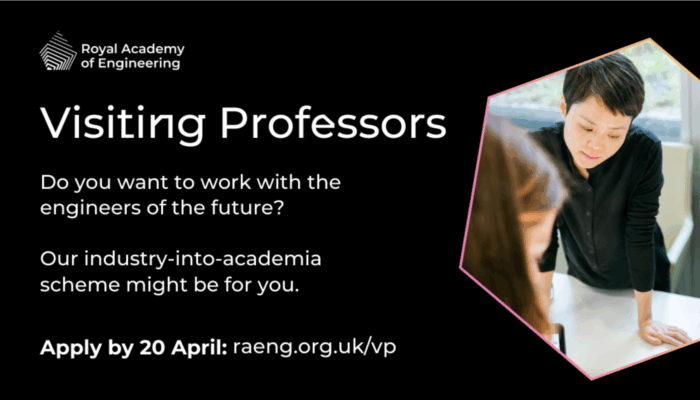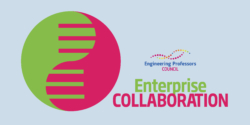 Theme: Graduate employability and recruitment
Theme: Graduate employability and recruitment
Authors: Dr Lisa Simmons (Manchester Metropolitan University), Dr Carl Diver (Manchester Metropolitan University), Dr Gary Dougill (Manchester Metropolitan University), Scott Pepper (GAMBICA), Paul Foden (NMCN) and Robin Phillips (Siemens Advanta Consulting).
Keywords: Graduate Outcomes, Employability, Engineering Education
Abstract: FutureMe is an event designed to enhance the aspirations, confidence and the graduate destinations of students. The series begins with an ‘industry week’- a unique collaboration between University and Industry – during which industry delivers keynote talks on: professional engineering, graduate skills, internationalisation, graduate destinations, and the flagship one day industry challenge. This event has been recognised by IET, and IMechE as good practice, in working collaboratively to show students what it is like to work as a professional engineer.
What is the case study about?
Assessment centre recruitment activities form an employment barrier to entry for students and can be challenging to prepare for. A large body of research suggests that motivation to begin and complete a degree in engineering; knowledge of the engineering field and its practitioners; along with students being able to identify themselves as “being an engineer” are all key drivers in student progression and graduate success. Through collaboration with industry partners, we have developed a range of events that not only give students much-needed preparation for the recruitment process but simultaneously allow them to explore their core identity and motivation.
This case study presents the development of the “FutureMe” event, which grew from a pragmatic approach to assessment centre preparation and into a self-sustaining, collaborative community between academia and industry.
What were its aims?
The core aims of the “FutureMe” activity are to:
- Provide students with an immersive learning experience with industrial partners to enhance aspirations, confidence and understanding of graduate destinations
- Provide industrial partners with the opportunity to work with students throughout their studies
- Provide students with the opportunity to learn about how engineers work within a business
How did it come about?
Preparing students for the assessment centre recruitment process alongside studies can be challenging. These recruitment activities are difficult, adversarial, and often intimidating for students who have limited – if any – opportunities to gain experience before they face a real recruitment panel.
“FutureMe” was established in the first instance to provide an opportunity for students to work with industrial partners on a challenge that replicated activities that are often given to applicants in an assessment centre. A key element of the challenge was that it should allow for multi-disciplinary and cross academic level working, and should not be overly technical to a particular discipline, rather it should give students an experience of how engineers work within business and the many functions within an organisation.
As the event was set up it grew to include keynote talks on; professional engineering, graduate skills, internationalisation, graduate destinations, and the flagship one-day industry challenge. Figure 1 illustrates the January 2022 schedule of events. Figure 2 provides further detail on the running order for the industry challenge session(s).
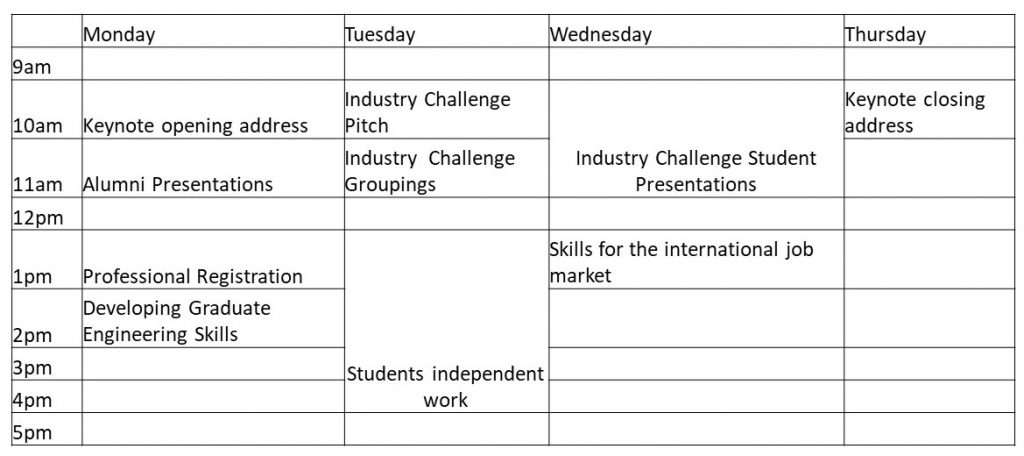
Figure 1 Example schedule of events
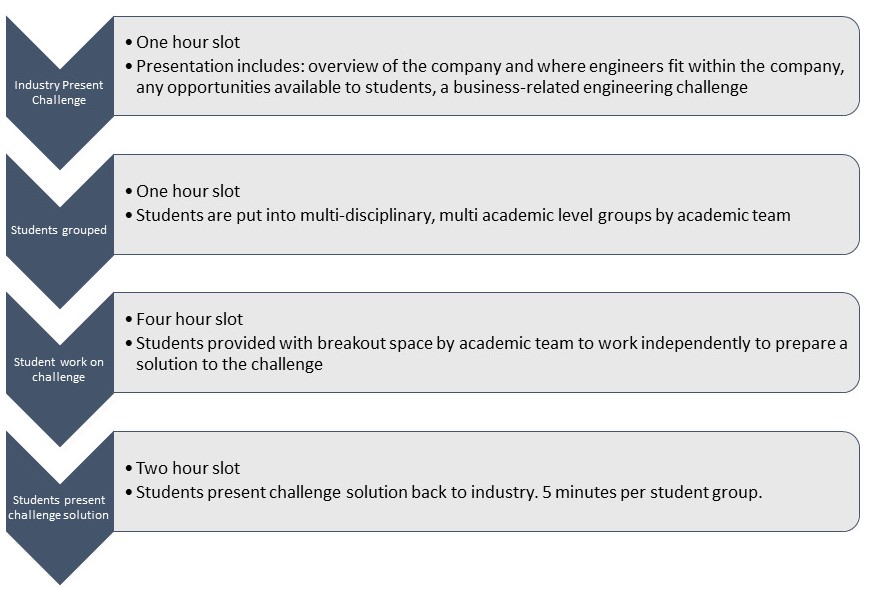
Figure 2 Industry Challenge Running Order
How was it set up?
Industrial partners were approached to take part in the event – the industry challenge – via the Department of Engineering’s Industrial Advisory Board (IAB), GAMBICA, GM Chamber of Commerce and IET Enterprise partners.
Industrial partners were presented with
- the rationale for the event
- the running order of the challenge and requirements/commitments
- learning requirements of the challenge
Interested parties then contacted the lead academic for a further meeting to discuss their challenge ideas and the event.
Figure 3 shows the process from initial email invites to industrial partners to the final challenge session
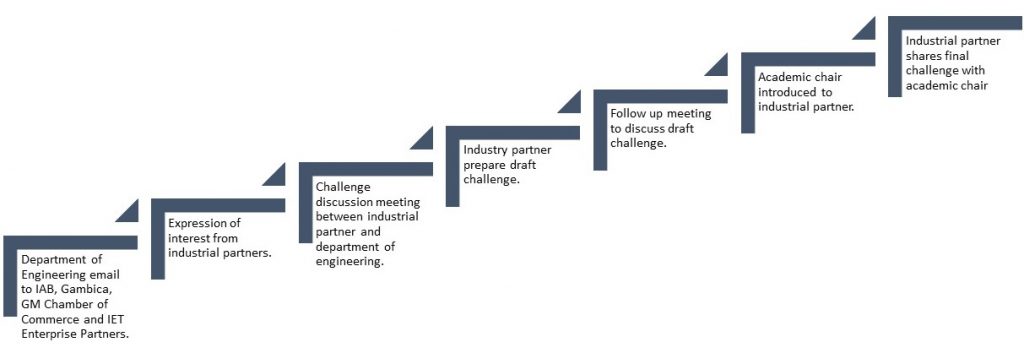
Figure 3 Step process showing how industrial partners develop a challenge to take part in the event
Who did it involve? (e.g., collaborating parties)
The rationale for the event was discussed for feedback with representatives from the Department of Engineering Industrial Advisory Board, GAMBICA and GM Chamber of Commerce.
All authors of this case study, worked collaboratively to develop the event, engage additional industrial partners, and feedback to the academic teams.
What were the outcomes?
FutureMe event has run in January 2021 and 2022.
In each event, there were 900 students invited, 50 supporting academics and 20+ industry representatives.
The event has led to additional opportunities for collaboration, for example, other employability events, and curriculum support in larger projects and guest lectures.
Are there any evidential outcomes?
Students were surveyed pre and post-event, on their understanding of their career readiness, their work experience, why they chose to take part in the event and what they gained from the event.
Reasons for taking part in the event were largely (75% of respondents) related to understanding how engineers work in industry and to learning more about graduate destinations for engineers.
Post-event students enjoyed the short period of time to complete the challenge, the breadth of access to industry representatives and learning about how engineers approach challenges in industry.
What lessons were learned, or what reflections can you provide? What might you do differently?
- Challenge development is a collaborative exercise between academia and industry to develop content that meets the learning criteria
- The event for 2023 will move to fully onsite
- Students need to have the benefits of attending the event clearly stated to improve student engagement
- There is an over-whelming amount of support from industry to support this event, such that there has been a need to develop new initiatives to provide further opportunities for collaboration
Feedback from Industry
The students who I spoke to excelled and performed better than several experienced engineers that I have been interviewing over the last few months.
I found the sessions very interesting, the discussions through the Q&A after the presentations were very good. It was great to be able to delve into more of the technology stack and see how they approach it. I also found it very interesting that the two groups chose different use cases/verticals for their research, and it tilted the result to slightly different outcomes. Really interesting to see that!
A brilliant process and a great opportunity for productive collaboration between MMU and industrialists in the interest of enhancing student employability. Without a doubt, the students were the stars of the show. Super job!
Any views, thoughts, and opinions expressed herein are solely that of the author(s) and do not necessarily reflect the views, opinions, policies, or position of the Engineering Professors’ Council or the Toolkit sponsors and supporters.

